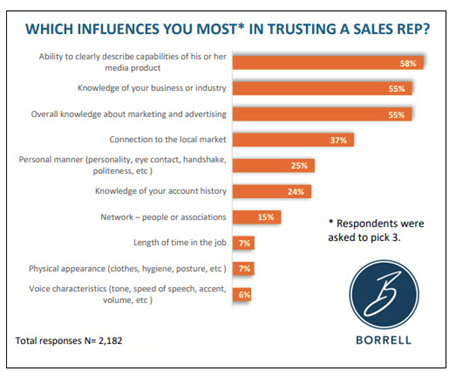
Sales managers and sellers can agree that developing trust with a customer is one of the most important parts of the sales process.
Simply put, customers don't buy from people they don't trust. However, they buy more from people they do trust! Here are some tips on how to develop trust with your customers.
In the most recent LinkedIn State of Sales report, sales  professionals in the United States rank trust as the No. 1 factor in closing deals (40%). Trust ranks higher than ROI and price, but more important, 51% of decision-makers rank trust as the top factor they desire in a salesperson.
professionals in the United States rank trust as the No. 1 factor in closing deals (40%). Trust ranks higher than ROI and price, but more important, 51% of decision-makers rank trust as the top factor they desire in a salesperson.
There are several things that influence customers when determine whether to trust a seller. Borrell and Associates recently surveyed to find the elements that most influence buyers when trusting a sales representative.
Here are the top three significant findings:
- The ability to clearly describe the capabilities of the product
- Knowledge of your (the customers) business or industry
- Overall knowledge about marketing and advertising

Sales 101: Know Your Customer
It makes sense that a seller should have the ability to describe their product capabilities and have an overall understanding of marketing and advertising. These items should be part of a basic sales 101 training program for all sellers.
Too often, sellers lead with a product as their first sales approach. As the Borrell survey indicates, the ability to describe their product capabilities is important; however, it’s not a be-all-end-all component to building trust. A component that’s often overlooked by sellers and managers is knowledge of your (the customers) business or industry—note that this is No. 2 on the survey.
Utilize Research Tools
Sellers can improve their knowledge of the customer’s business or industry and communicate business insight to the customer through the use of research tools. This will help sellers move beyond small talk and get to the important trends impacting the customer.
Here are a couple of easy ways to conduct some research to uncover these business insights:
- A Google search … challenges facing (insert client name).
- Check out Yelp reviews to see what their customers are saying (positive or negative).
- Knowledge from other businesses in the category.
- Think like an owner and develop an understanding of how their business is run and how the customer spends their time. Perhaps developing a relationship with an inside coach at the customer level will provide some insight.
- Communicate empathy, expertise, and problem solving when you are setting the appointment with the customer.
The Perfect Formula
Empathy
The seller understands and related to the customer's problems, challenges, or opportunities based on business insights.
- WHY: You demonstrate empathy, so that it’s clear that you know where the customer is coming from. Doing this helps the customer believe that connecting with you won’t be a waste of their time.
- HOW: You can demonstrate empathy by sharing insight or information of interest. You may share an observation related to their industry, stating the upcoming peak season for their business category, or perhaps a challenge related to a new competitor, marketing, or advertising.
Expertise
Share a success story related to expertise in the category.
- WHY: You demonstrate expertise so the customer gets a glimpse into your knowledge and the resources you use to help other customers. Doing this gives them a reason to believe you might be able to offer them value.
- HOW: You can demonstrate expertise by also sharing an insight or industry information. To be effective in this area, you need to continuously educate yourself and remain relevant.
Problem-Solving
Insight about the seller’s ability to create a solution based on understanding of customer needs.
- WHY: You demonstrate problem-solving so that the prospect will lean in and imagine how you might be able to help them with their problems.
- HOW: Share great solutions you have developed for other customers. Focus as much on the process you followed as the results you were able to help a customer achieve.
Is Your Sales Training Platform Up To Date?
The insight from the survey is significant and should not be overlooked because it provides a clear roadmap and understanding of what customers consider when developing trust.
The million-dollar question is, does your sales training platform include the top significant elements that most influence buyers when trusting a sales representative?
- The ability to clearly describe the capabilities of the product
- Knowledge of your (the customers) business or industry
- Overall knowledge about marketing and advertising
If not, perhaps it is time to consider a new approach to training your sellers.



